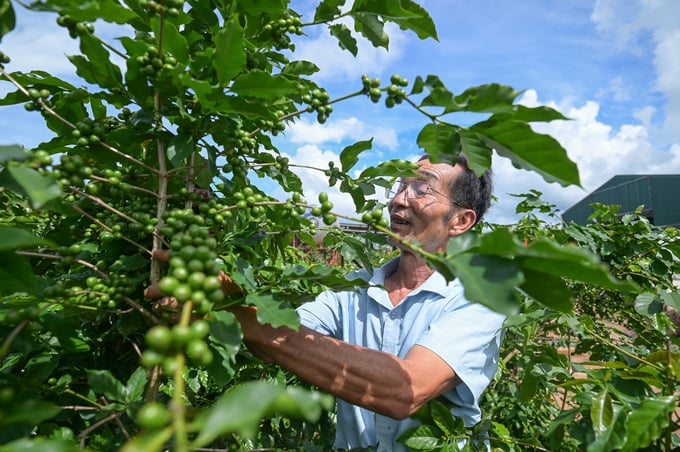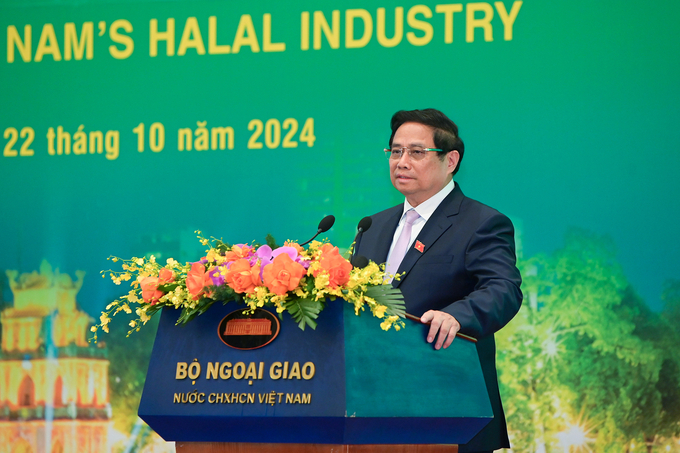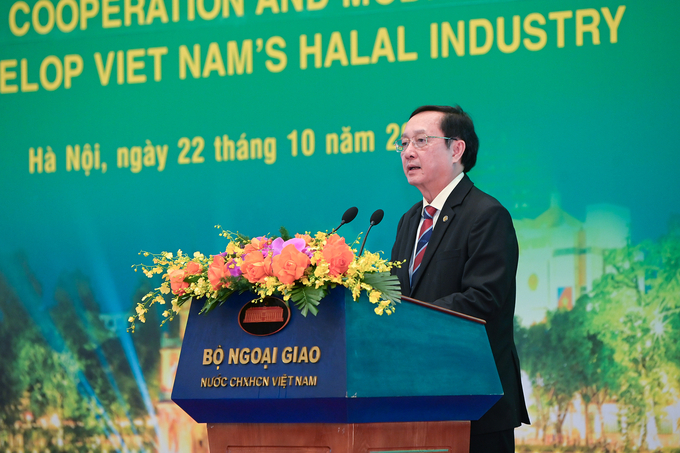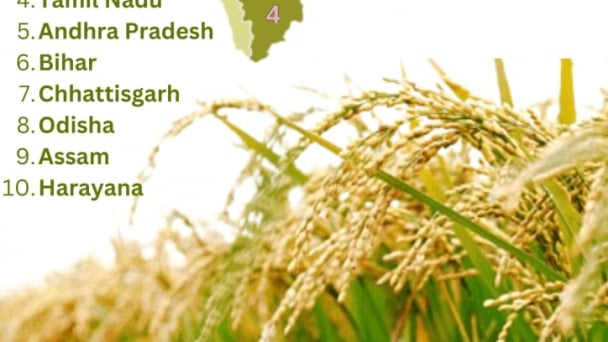June 20, 2025 | 08:31 GMT +7
June 20, 2025 | 08:31 GMT +7
Hotline: 0913.378.918
June 20, 2025 | 08:31 GMT +7
Hotline: 0913.378.918

According to Prime Minister Pham Minh Chinh, Vietnamese agriculture has many products suitable for the Halal market. Photo: Tung Dinh.
Prime Minister Pham Minh Chinh noted that Vietnam is well aware of the significance of the global Halal market and acknowledges its potential and advantages. In the past few years, Vietnam has conducted coordinated efforts to advance the Halal industry, and it has achieved promising preliminary results.
Vietnam has established a strategic plan for the expansion of the Halal sector until 2030, which includes a proposal to "Strengthen International Cooperation to Develop Vietnam's Halal Industry by 2030."
The Prime Minister expressed a desire to transform Vietnam's Halal industry into its true strength, positioning the country as a key destination on the global Halal map and an essential link in the global supply chain for Halal products and services.
Vietnam has three primary advantages that can assist it in "catch up, move along with, and surpass" in the Halal sector in order to accomplish this objective. Initially, Vietnam boasts a stable political and social environment, an emerging economy, and an investment environment that is becoming increasingly favorable and open.
Secondly, Vietnam is dedicated to a foreign policy that is independent and autonomous, characterized by multilateralism and diversification, and that is characterized by the cultivation of alliances and the assumption of responsibility within the international community.
"Vietnam is a peace-loving nation that desires no one to be left behind, and no one to suffer from war and conflict," emphasized the Prime Minister.

The Prime Minister hopes that Vietnam will become an important link in the Halal value chain. Photo: Tung Dinh.
Thirdly, Vietnam offers numerous of benefits for the development of the Halal industry and its integration into global Halal supply chains. "Vietnam's agriculture plays a key role in ensuring global food security, with many agricultural products that meet Halal standards," noted the Prime Minister of Vietnam.
Additionally, Vietnam boasts a coastline that extends for more than 3,000 kilometers, a variety of ecosystems, and some of the world's most stunning beaches, all of which have the potential to contribute to the growth of tourism, including Halal tourism.
The Prime Minister provided three messages for Vietnam's Halal sector, all of which were based on his insights into the Halal economy. Initially, Vietnam is eager to establish Halal cooperation as a substantial economic element and a new pillar of its relations with other countries, as well as the global Muslim community.
Secondly, Vietnam considers the Halal industry to be a new production focus, perceiving it as a "golden opportunity" for Vietnamese enterprises to improve production capacity and collaborate with partners in order to effectively participate in the global Halal market and value chain.
Thirdly, Vietnam's objective is to establish the Halal sector on the basis of human dignity and cultural values, which is a sign of Vietnam's positive and responsible role in the establishment of a world that is peaceful, cooperative, diversified, and harmonious, with the ultimate goal of ensuring the well-being and contentment of all individuals.
The Prime Minister underscored five solutions in order to achieve these objectives. The initial objective is to enhance collaboration in the areas of information exchange, experience, and support for Vietnam in the refinement of the legal framework and state management in the field of Halal, as well as the establishment of a national Halal standard.
The following step is to improve the negotiation, agreements, memoranda of understanding, and mutual recognition processes for Halal certification. Third, to cultivate regional and international partnerships that will facilitate investment and business operations in Vietnam, with a particular emphasis on agriculture and tourism that are associated with Halal.
Additionally, Vietnam is committed to the development of new markets for Vietnamese Halal exports and the promotion of Halal products, services, and brands.
Lastly, Vietnam will enhance the potential for cooperation in the development of the Halal sector in Vietnam by fostering mutual comprehension between citizens and enterprises through the strengthening of people-to-people exchanges and cultural collaboration.
The Ministry of Science and Technology has proactively established national standards for Halal, which encompass Halal food, agricultural production, livestock fodder, and animal slaughtering, in accordance with the Prime Minister's directive.
Vietnam establishes itself as a dependable source of certified Halal products through the implementation of Halal certification, which creates new opportunities for Vietnamese producers on the global market.
During 2023, the Ministry of Science and Technology established the national standard for Halal certification organizations through an announcement. In 2024, it oversaw the creation of a National Halal Certification Center and the development of the national standard "TCVN 14230:2024 Muslim-Friendly Tourism Services – Requirements to Facilitate Attracting Muslim Tourists to Visit, Relax, and Conduct Conferences in Vietnam."

Minister of Science and Technology Huynh Thanh Dat affirmed that Vietnam has proactively developed national standards on Halal in recent times. Photo: Tung Dinh.
Minister Huynh Thanh Dat is certain that this national standard will assist Vietnamese tourism and travel businesses in enhancing the value of their products by catering to visitors from the Middle East and Muslim-majority countries, thereby contributing to Vietnam's Halal sector development program.
The Ministry will persist in establishing a sustainable Halal ecosystem by collaborating with other ministries, sectors, business communities, and international partners. The Ministry will concentrate on standardizing production processes, enhancing scientific research capabilities, developing technology, and strengthening Vietnam's Halal certification capacity to guarantee that Vietnam's products and services adhere to the most stringent international standards.
Yousif S. AlHarbi, Vice President of the Halal Center of Saudi Arabia and the Saudi Food and Drug Authority (SFDA), observed that the establishment of Vietnam's Halal Certification Center is a significant milestone in advancing Vietnam's position in the global Halal economy.
Translated by Linh Linh

(VAN) Last week, the U.S. Department of Agriculture (USDA) released its June World Agricultural Supply and Demand Estimates (WASDE), raising projections for both Indian rice production and U.S. rice imports for the 2025/2026 marketing year.
/2025/06/17/2344-1-131758_261.jpg)
(VAN) Amid tariff risks and growing trade barriers in the U.S. market, Australia is emerging as a promising destination to sustain the growth momentum of Vietnam's shrimp exports.
/2025/06/17/2013-1-nongnghiep-112009.jpg)
(VAN) This notable growth trend reflects the global taste for fresh, nutritious fruits and the expanding use of lychees across various sectors.

(VAN) The political and cultural insulation of Japan’s beloved grain is falling apart, and experts warn the country’s relationship with the staple will have to adapt.

(VAN) Noting risks, report examines impacts of avian influenza, changing trade patterns since 2022, fish fraud, and shipping industry’s net-zero goals.

(VAN) Mr. Tran Quang Bao, General Director of the Forestry and Forest Protection Department, met and worked with the International Wood Products Association to promote cooperation in the field of timber trade.

(VAN) China's outbound shipments of rare earths in May jumped 23% on the month to their highest in a year, though Beijing's export curbs on some of the critical minerals halted some overseas sales.